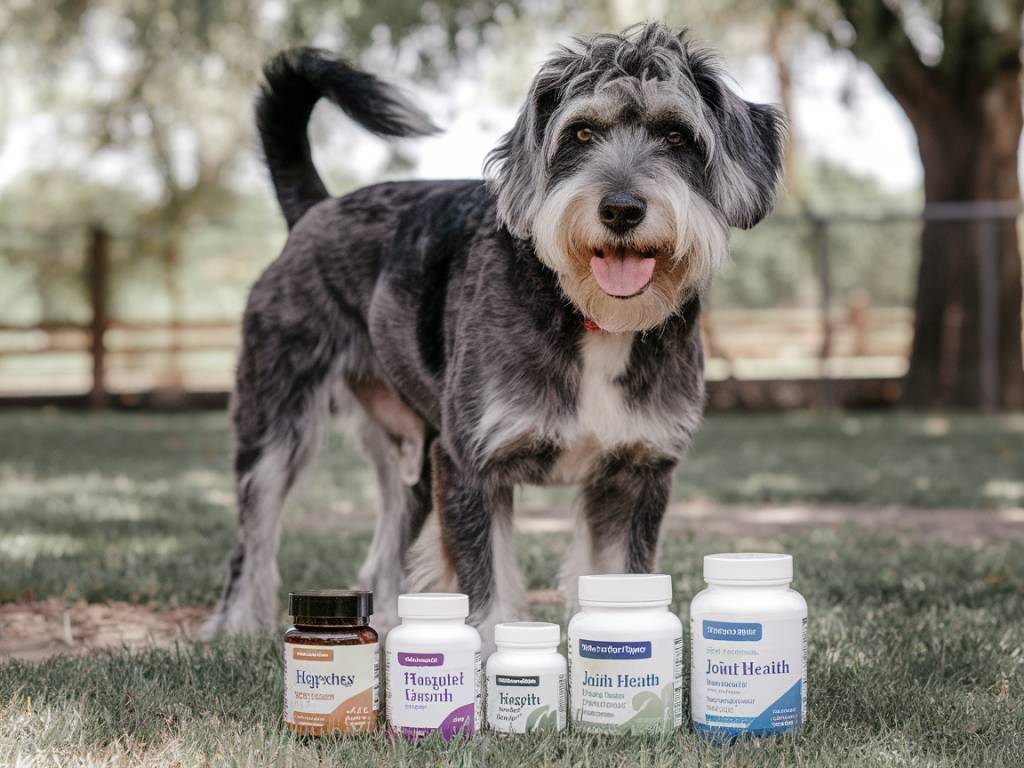As our beloved canine companions age, they may begin to experience joint issues that can impact their quality of life. Just like humans, dogs can suffer from arthritis and other joint problems as they get older. This can lead to pain, reduced mobility, and a decreased ability to enjoy their favorite activities. One way to help senior dogs maintain their joint health is to consider the use of supplements. In this article, we’ll explore some of the most effective supplements that can support joint health in senior dogs, along with tips for choosing the right ones.
Understanding Joint Health in Senior Dogs
Before diving into specific supplements, it’s important to understand the underlying issues of joint health in senior dogs. As dogs age, the cartilage that cushions their joints can wear down, leading to friction between bones and causing discomfort or pain. Conditions like osteoarthritis are common in senior dogs and can significantly affect their mobility and lifestyle.
Common signs of joint issues in dogs include:
- Limping or favoring one leg
- Stiffness, especially after resting
- Reduced activity or reluctance to play
- Difficulty with routine activities, like climbing stairs or jumping onto furniture
- Visible pain when touched or handled
Recognizing these signs early and taking proactive steps can help ensure your senior dog remains active and comfortable in their senior years.
Key Supplements for Joint Health
There are several supplements that are frequently used to support joint health in senior dogs. These supplements are designed to support joint function and maintain mobility. Let’s take a closer look at some of the key options:
Glucosamine
Glucosamine is one of the most common supplements used to support joint health in both dogs and humans. It is a natural compound found in cartilage and is thought to aid in the repair and regeneration of cartilage tissue, as well as providing some anti-inflammatory effects.
Glucosamine supplements are often combined with chondroitin sulfate, which enhances their effectiveness by providing additional support for cartilage health. When selecting glucosamine supplements, look for products that include both glucosamine and chondroitin for maximum benefit.
Chondroitin Sulfate
Chondroitin sulfate works synergistically with glucosamine to support joint health. It is a component of cartilage that provides resistance to compression, and it may help slow the breakdown of cartilage in the joints. Chondroitin sulfate is often recommended in combination with glucosamine, as together, they can be more effective than when used separately.
Omega-3 Fatty Acids
Omega-3 fatty acids are well known for their anti-inflammatory properties. Found in fish oil and other sources, omega-3s can help reduce joint inflammation in senior dogs and support overall joint health. Adding a high-quality omega-3 supplement to your dog’s diet can help improve their mobility and reduce pain associated with arthritis.
When choosing an omega-3 supplement, look for products derived from high-quality fish oil with an adequate concentration of EPA and DHA, the key active ingredients.
Green Lipped Mussel
Green lipped mussel is a natural source of glycosaminoglycans (similar to glucosamine) which aid in joint lubrication and shock absorption. It also contains omega-3 fatty acids and antioxidants, making it a powerful supplement for reducing joint pain and inflammation in senior dogs.
Many dog owners have reported improvements in their dogs’ mobility after introducing green lipped mussel to their supplement regimen. It is available in both powder and chewable forms.
Turmeric (Curcumin)
Turmeric is a spice that contains curcumin, a compound known for its potent anti-inflammatory properties. Though more research is needed, some evidence suggests that curcumin can help alleviate pain and improve mobility in dogs with arthritis.
It’s important to note that curcumin has low bioavailability on its own, so it’s often combined with piperine (black pepper extract) or given in a supplement form designed for better absorption. Always consult with your veterinarian before adding turmeric or curcumin supplements to your dog’s diet to determine the appropriate dosage.
Choosing the Right Supplements for Your Dog
When selecting supplements for your senior dog’s joint health, there are several factors to consider:
- Consult your veterinarian: Before starting any new supplement regimen, it’s best to consult your veterinarian. They can provide guidance on the most appropriate supplements for your dog’s specific needs and health conditions.
- Quality of supplements: Not all supplements are created equal. Look for high-quality brands that use natural ingredients and have undergone third-party testing for effectiveness and safety.
- Dosage and administration: Pay attention to the recommended dosage on supplement labels, and ensure it is appropriate for your dog’s size and weight. Administration methods vary, including capsules, chewables, and powders you can mix with food, so choose the one that suits your dog’s preferences.
Additional Tips for Supporting Joint Health in Senior Dogs
In addition to supplements, there are other ways you can support your senior dog’s joint health:
- Maintain a healthy weight: Extra weight puts additional strain on joints, so ensure your dog maintains a healthy weight through a balanced diet and regular exercise.
- Provide regular, moderate exercise: While too much strenuous exercise can exacerbate joint issues, regular moderate activity helps keep joints flexible and maintains muscle strength.
- Offer comfortable bedding: Soft bedding provides support and cushioning for your dog’s joints as they rest, helping to alleviate stiffness.
- Consider physical therapy or acupuncture: Depending on your dog’s condition, therapies like physical therapy, hydrotherapy, or acupuncture may provide relief and improve mobility.
By being proactive about joint health, you can help ensure that your senior dog remains comfortable and active throughout their golden years. Supplements can be a valuable tool in managing joint health, but they should be part of a comprehensive approach that includes proper diet, exercise, and veterinary care.
With thoughtful care and the right supplements, you can help your senior dog continue to lead a happy, active life. Give your pet the support they need to enjoy every moment to the fullest.
Written by Lisa Tissed

